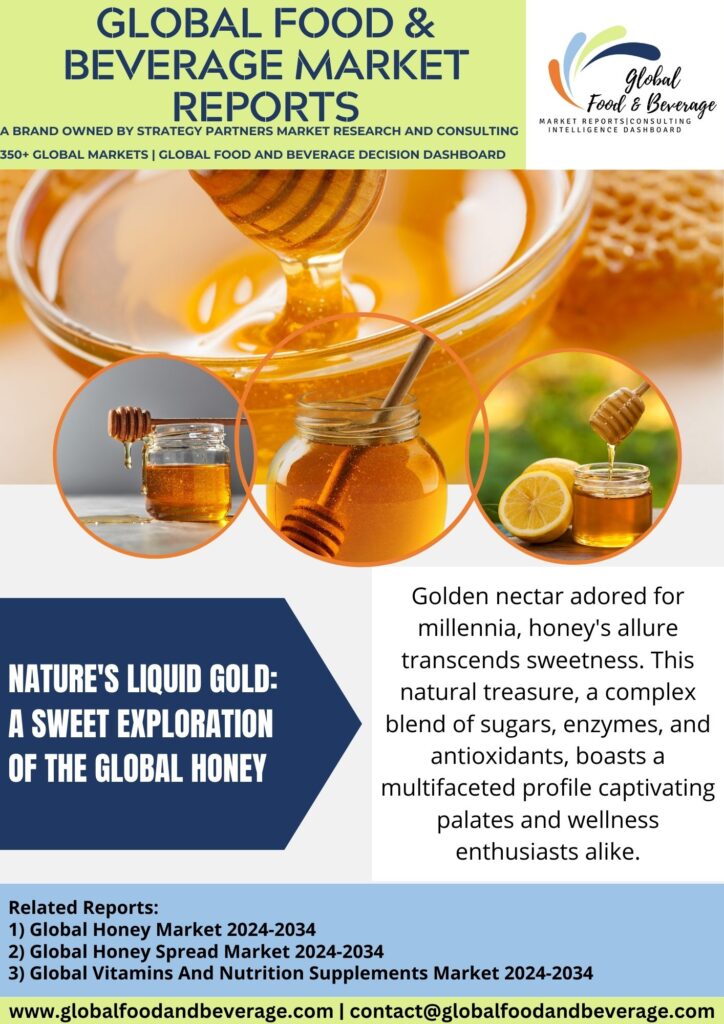Nature’s Liquid Gold: A Sweet Exploration of the Global Honey Market
Honey, the golden nectar produced by bees from the nectar of flowers, has been treasured by humans for its sweetness and myriad health benefits for centuries. Beyond being a natural sweetener, honey possesses unique qualities that set it apart in the culinary and wellness realms. Its flavor profile varies based on the types of flowers visited by the bees, resulting in a diverse range of honey varieties, from the delicate and floral acacia honey to the robust and earthy buckwheat honey.

In addition to its delightful taste, honey boasts antimicrobial and antioxidant properties, making it a natural remedy with a long history of use in traditional medicine. Raw, unprocessed honey is particularly prized for retaining its beneficial enzymes and compounds that contribute to its health-promoting qualities. Honey has been employed to soothe sore throats, alleviate coughs, and even aid in wound healing, acting as a versatile elixir that transcends its role as a mere sweetener.
Beyond its medicinal uses, honey plays a crucial role in global culinary traditions. It is a versatile ingredient in both sweet and savory dishes, offering depth of flavor and natural sweetness. From drizzling honey over yogurt and fruits to incorporating it into marinades and salad dressings, its culinary applications are as diverse as the cultures that have embraced it.
The importance of honey extends to the ecological realm, as bees, the primary pollinators of flowers, contribute to the pollination of various crops. The intricate dance between flowers and bees not only sustains the production of honey but also supports biodiversity and the agricultural systems that rely on pollination.
As consumers increasingly seek natural and unprocessed food options, honey has experienced a resurgence in popularity. The market for artisanal and locally sourced honey has grown, with consumers appreciating the distinct flavors and potential health benefits of honey produced in specific regions. In essence, honey stands as a testament to the harmonious relationship between nature and human culture, providing not only sweetness to our palates but also a connection to tradition, well-being, and the intricate ecosystems that sustain us.
ADVANCEMENTS
The honey industry showcase innovations in production, quality control, and diversification of honey-based products. One significant breakthrough is the adoption of precision beekeeping technologies. Beekeepers are leveraging sensors, data analytics, and even artificial intelligence to monitor hive conditions, optimize bee health, and enhance honey production. This technology-driven approach promotes sustainable beekeeping practices and helps mitigate challenges such as colony collapse disorder.
Advancements in honey harvesting methods have improved efficiency and minimized environmental impact. Technologies such as vacuum-assisted extraction and automated honey extraction systems contribute to higher yields while ensuring the preservation of hive health and honey quality.
Quality control measures in the honey industry have become more sophisticated. Advanced testing methods, including nuclear magnetic resonance (NMR) spectroscopy, help verify the authenticity and geographical origin of honey, addressing concerns related to adulteration and fraud. These methods provide consumers with greater transparency and assurance regarding the purity of the honey they consume.
The diversification of honey products goes beyond traditional varieties. Infused and flavored honeys, as well as honey blends with other functional ingredients, cater to evolving consumer preferences. These innovations expand the culinary and wellness applications of honey, positioning it as a versatile and sought-after ingredient.
The rise of organic and sustainably sourced honey reflects a broader commitment to environmental and ethical practices in the industry. Beekeepers are adopting organic certification standards, implementing agroecological approaches, and promoting biodiversity in apiaries to produce honey that aligns with consumer values.
CHALLENGES
The honey industry encounters challenges across production, quality control, market competition, environmental factors, and regulatory compliance. One significant challenge is maintaining the quality and authenticity of honey. Adulteration, often involving the addition of sugars or other substances, poses a threat to the integrity of the honey supply chain. Establishing and enforcing stringent quality control measures is crucial for ensuring the purity of honey products.
Environmental factors, including climate change and habitat loss, impact honeybee populations and floral sources. The decline in bee populations affects honey production, highlighting the importance of sustainable beekeeping practices and the preservation of natural habitats to support pollinators.
Market competition is intense, with various honey products available in the market. Successfully differentiating products, addressing diverse floral sources, and maintaining a competitive edge demand continuous innovation in packaging, marketing strategies, and product offerings.
Regulatory compliance is a complex challenge in the honey industry. Meeting standards related to labeling, safety, and authenticity requires continuous diligence to ensure transparency and compliance with evolving regulations, including geographical indications for specific types of honey.
International trade complexities add another layer of challenge, especially concerning honey origin and traceability. Ensuring traceability and meeting the requirements of importing countries’ regulations demand robust documentation and adherence to international standards.
Consumer education is crucial for promoting the various types and benefits of honey. Communicating the differences between raw, organic, and processed honey, as well as the importance of supporting sustainable beekeeping practices, is essential for building consumer awareness and trust.
CONCLUSION
Honey remains an enduring testament to nature’s sweet abundance, captivating taste buds and cultures worldwide. Beyond its delectable taste, honey embodies a rich tapestry of health benefits and cultural significance. From ancient rituals to modern culinary creations, it stands as a timeless and versatile elixir. As consumers increasingly embrace natural and locally sourced options, honey represents both tradition and sustainability. The industry’s commitment to purity and diverse varietals reflects a dynamic fusion of heritage and innovation. The future holds a continued appreciation for honey’s multifaceted charm, where every golden drop signifies not just sweetness but a connection to nature’s timeless, wholesome bounty.
